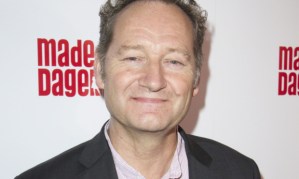Review: Kiss Me (Trafalgar Studios)
Richard Bean’s play, set a decade after the First World War, transfers to the West End
Wars don’t end with armistice – not really. The fighting might come to an end, but the injuries stretch like long shadows. War bleeds into peace; it scars the future. Set in 1929, Richard Bean‘s trim little history play takes place more than a decade after the declaration of peace, but, for the two strangers staring at each other over a single bed, the First World War is still all too present.
A woman waits in her bedroom, a war widow. She’s no longer grieving for her husband, but her life is defined by his loss. Too old to remarry, she’s facing a future without children. Her doctor’s solution goes against the era's every expectation; a surrogate father.
Kiss Me explores that encounter – the Tinder hook-up of its time. It is, by turns, awkward, tender and enigmatic. Ben Lloyd-Hughes‘s male escort of sorts seems to materialise by magic: this perfect, handsome gent delivered by blackout and insistent on anonymity. He’s as English as Earl Grey – umbrella over one arm, black bowler in hand; a public schoolboy going by a pseudonym, Dennis Boleyn, and giving nothing away. If Claire Lams looks anxious by comparison, he stands to attention (not like that) with a face as stoic as an Easter Island statue. For him, this is duty. For her, doctor’s orders. A generation of men has been wiped out. Britain is a nation of childless widows. It needs repopulating and, more to the point, it needs sex. How better to move on from grief?
Long before Bean became the go-to gagman of British theatre – One Man Two Guvnors as his calling card – he wrote with a rich sense of atmosphere, often in small spaces. Kiss Me, originally tucked away in the secretive Hampstead Downstairs, is a return to that. Bean can’t resist the odd laugh-line, but mostly Kiss Me is infused with a quiet drama.
It’s in a woman negotiating with her conscience, and a couple inching closer to one another. Anna Ledwich’s production embraces the demur romance between the pair, but Bean never lets us lose sight of the encounter’s artifice, specifically the question of this man’s motives. Is this a noble act or a sleazy one? Is it rooted in the survivor’s guilt of a wartime sugar merchant, or the exploitative opportunism of an inveterate cad?
By the time 'Dennis' reveals the extent of the scheme – 202 children from 711 lovers – it’s impossible to know what to make of him. Lloyd-Hughes is entirely inscrutable. The darkness behind his eyes suggests a sex addict as much as a saviour.
If some of the exposition is clumsy – the widow is far too willing to give every detail of her life story away – the situation is an intriguing one that throws some light on history. It is an unexpected encounter, more transgressive and progressive than we might imagine of 1920s Britain. As is the widow herself: a munitions worker who kept her job, now willing to face life as a single mother. The question, perhaps, is whether her empowerment plays to his advantage. Do sexually adventurous women make easier prey?
But it’s the lingering sadness that sticks out, emphasised by the rusted mirrors of Georgia Lowe’s design. Bean draws a woman weighed down by the war years later and, from our vantage point, a decade after an earth-shaking economic crash of our own, that feels all too truthful. History doesn’t just happen. It drags on and so drags a generation down. Hope, perhaps, comes with the next.
Kiss Me runs at the Trafalgar Studios until 8 July.













